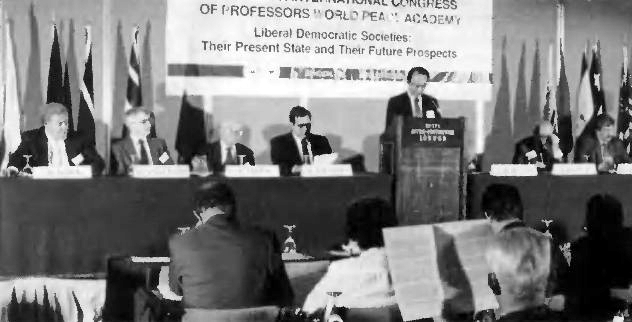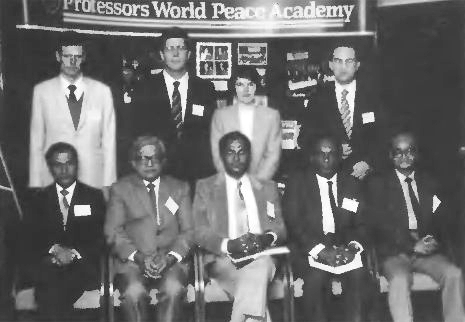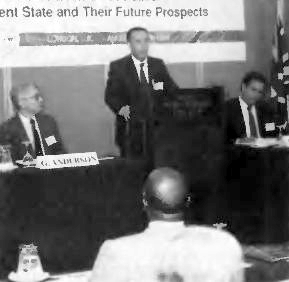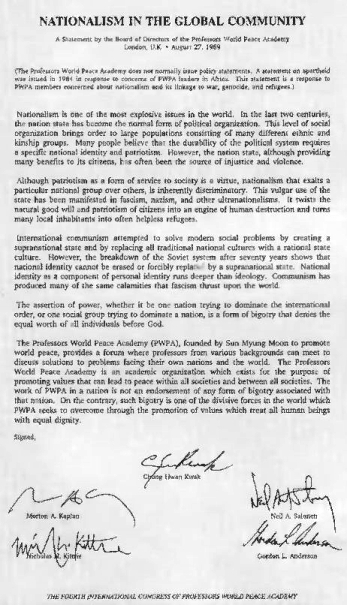![]()
The Words of the Anderson Family
|
|
The Words of the Anderson Family |

Rev
Chung Hwan Kwak delivers his address at the Opening Convocation
The Fourth International Congress of PWPA was held on August 25-29, 1989 on the theme "Liberal Democratic Societies; Their Present State and their Future Prospects," at the Inter-Continental Hotel on beautiful Hyde Park Corner in downtown London. The conference consisted of PWPA Presidents from 84 countries and 85 paper-writers who are experts on the conference theme. There were a total of 345 participants.
At the Second International Congress held in Geneva in 1985 the theme was "'The Fall of the Soviet Empire': Prospects for Transition to a Post-Soviet World." The Third International Congress investigated the Chinese society. These two conferences each generated four volumes of Paragon House-PWPA Books, some of which have received course adoptions in American colleges.

Leaders
of PWPA in South Asia pose for a group photo.
This conference on Liberal Democracy was held at a time when people around the world are calling for democracy. The restructuring in Eastern Europe, the cry for "one man one vote" in South Africa, and the pro-democracy movement in China are all examples of this tendency. Reverend Kwak, in his opening address, cautioned that we need to examine democracy more fully because not all forms have been successful or desirable. He stated in his address that:
The success of liberal society depends on the responsible moral life of its citizens. People are motivated to work hard for their society when they feel that they are contributing to themselves, their families, their communities and to a good or divine society. The American founding fathers believed that the system of government which included checks and balances would protect the citizens against anyone taking absolute political power; however, they knew that for their system of constitutional democracy to survive the citizens had to act morally and responsibly. They left the creation of virtuous people to the traditional institutions of family, church and community. This arrangement has never completely succeeded.
Judge Robert Bork followed with a major plenary address in which he spoke of an "emptiness at the heart of liberalism," and the United States as currently a culture at war, with each group trying to win for itself through the political process in Washington. The sense of common purpose has been lost.
For the following three days sixteen panels discussed the present state of liberal democracy from the standpoint of different sectors of society: law, media, the arts, religion, economics, and so forth. In his concluding remarks, Professor Edward Shils said that the conference was a success because a number of general conclusions could be drawn from the conference which could serve as a milestone assessment of liberal democratic societies.
The academics generally agreed on the merits of liberal democracy, the value of scientific knowledge, the market economy, freedom of contract, patriotism without chauvinism, the important function of religion, effective and relatively non-intrusive government, and the value of the family. While many people may say this is common sense, all of these things have been on the defensive for the better part of this century. All of these things were assaulted by Marxists and left-leaning academics as part of the ruling class culture that led to oppression. The merits of these ideas, Shils stated, have now been vindicated in the academic community.
On the other hand, Shils noted that Liberal Democratic societies were far from perfect, and that many problems regarding education and poverty exist that need urgent attention. One of the major points of his concern was the standards of truthfulness in information given to the general population by the so-called "knowledge class," which consists of the media, school teachers, politicians, and administrators. Too frequently accurate information in the hands of experts becomes distorted and misrepresented by the time it reaches students and voters. This makes it difficult for voters to make responsible decisions at the polls and in their communities and is thus harmful to the proper functioning of democracy.

PWPA
Presidents' Plenary Session
The real purpose of this congress goes beyond the particular theme under discussion. The congress is a place for the building of the international PWPA network. Each day after the academic discussions had ended, the Professors World Peace Academy national chapter presidents gathered to discuss activities
The first evening at a PWPA presidents plenary, reports on PWPA activities in Korea, Africa, and Latin America were presented. This was followed by Reverend Kwak's address to the presidents where he unveiled the plan for the New World Festival and the central role that the international marriage ceremony performed by Father would play in this festival event. Regional leaders were there and asked to work with the presidents in coordinating New World Festival activities. Then pamphlets which had been prepared for the occasion were distributed. Mr. Neil Albert Salonen, who has been Reverend Kwak's main assistant on the festival preparation committee, handed out packets of information to help inform the PWPA leaders about other projects founded by Father which have been asked to participate in the New World Festival.
The following two evenings, the PWPA presidents met by region, both to plan future PWPA activities and to determine how they could respond to Reverend Kwak's request to assist in bringing people to the New World Festival.

The PWPA Congress also provides an opportunity for a number of other PWPA meetings to take place, one of which is the meeting of the PWPA Board of Directors. This year the directors signed a statement titled "Nationalism in the Global Community." This was the first position statement ever to be signed by the directors, although Reverend Kwak signed the "Statement on Apartheid in South Africa" in 1984 with the Board's approval.
Among other things, the PWPA Congress always provides a big boost to the host country; in this case, England and PWPA Europe. There has been a flurry of newspaper articles in Europe in recent years accusing PWPA, the Unification Church, or other organizations founded by our Father, of being "fascist" or "neo-Nazi" or containing some other form of right-wing bigotry. Some of these allegations led to declined invitations or forced the early withdrawal of participants in the congress. The statement was intended to set the record straight when journalists or professors question our position on these issues. The statement can also assist members around the world, because it deals with one of the most pressing issues of the 20th century.